Unit 3课后练习答案
- 格式:doc
- 大小:39.50 KB
- 文档页数:5
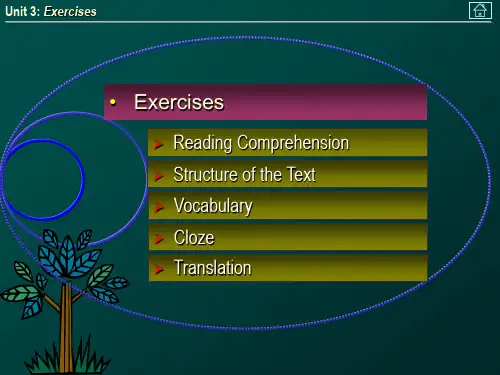
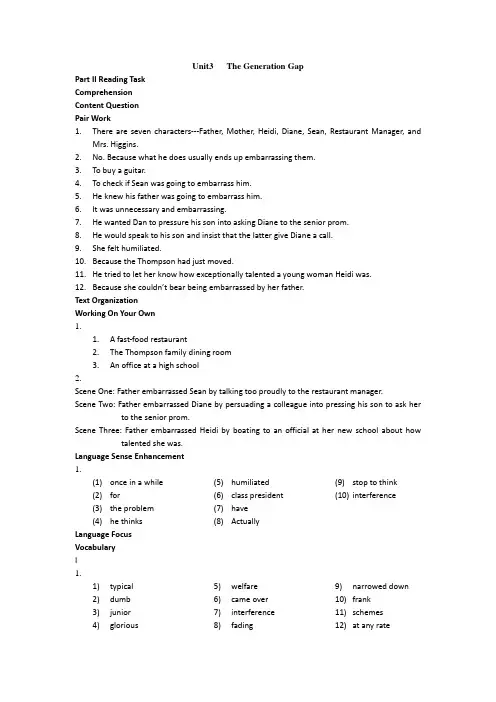
Unit3 The Generation GapPart II Reading TaskComprehensionContent QuestionPair Work1.There are seven characters---Father, Mother, Heidi, Diane, Sean, Restaurant Manager, andMrs. Higgins.2.No. Because what he does usually ends up embarrassing them.3.To buy a guitar.4.To check if Sean was going to embarrass him.5.He knew his father was going to embarrass him.6.It was unnecessary and embarrassing.7.He wanted Dan to pressure his son into asking Diane to the senior prom.8.He would speak to his son and insist that the latter give Diane a call.9.She felt humiliated.10.Because the Thompson had just moved.11.He tried to let her know how exceptionally talented a young woman Heidi was.12.Because she couldn’t bear being embarrassed by her father.Text OrganizationWorking On Your Own1.1. A fast-food restaurant2.The Thompson family dining room3.An office at a high school2.Scene One: Father embarrassed Sean by talking too proudly to the restaurant manager.Scene Two: Father embarrassed Diane by persuading a colleague into pressing his son to ask her to the senior prom.Scene Three: Father embarrassed Heidi by boating to an official at her new school about how talented she was.Language Sense Enhancement1.(1)once in a while(2)for(3)the problem(4)he thinks (5)humiliated(6)class president(7)have(8)Actually(9)stop to think(10)interferenceLanguage Focus VocabularyI1.1)typical2)dumb3)junior4)glorious 5)welfare6)came over7)interference8)fading9)narrowed down10)frank11)schemes12)at any rate2.1)consists of five generals and four police officers.2)will be in a location overlooking the lake.3)was humiliated by her comments about my family background in front of so manypeople.4)have any proof that it was Henry who stole the computer5)was exhausted after the long cycle ride.3.1)hysterical; was handed down by; should have known better than2)twisted; over and over; talented son3)patience; not to keep him in suspense; assured; repeatedlyI.Collocation1.adequate2.anxious3.certain4.content5.crazy6.likely7.fortunate8.keenage1.be admitted2.live3.be postponed4.buy5.be banned6.beComprehensive Exercises I.cloze1.(1)typical(2)welfare(3)constant(4)frank(5)talent(6)dumb (7)know better than that(8)repeatedly(9)dread(10)interference(11)bet(12)assure2.(1)despite(2)really(3)same(4)contact(5)admitted(6)attempt(7)not(8)tend(9)different(10)mannerII.Translation1.(1)Have scientists found proof of water on Mars(2)The planning committee has narrowed down the possible locations for the nuclearpower plant to two coastal towns.(3)Sam not only lost his job but also both legs; he had to live on welfare for the rest of hislife.(4) A jury consisting of 12 members voted in unison that Mary was guilty.(5)Sean felt humiliated to hear his talent being questioned.2.George, the son of Mr. Johnson, liked listening to heavy metal music in the evenings, which made it hard for other residents in the community to fall asleep. Eventually the exhausted neighbors lost their patience and decided on direct interference. They called Mr. Johnson to tell him in a frank manner what they were thinking. Mr. Johnson assured them that he would certainly settle the issue. As soon as he put down the phone he scolded his so n, “What has come over you You should know better than to disturb others for your own amusement.” In the end George traded his CD’s for computer games software from his classmates.。
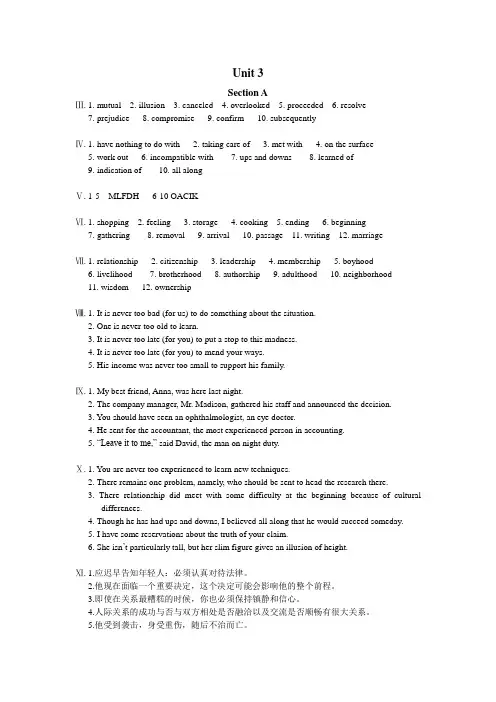
Unit 3Section AⅢ. 1. mutual 2. illusion 3. canceled 4. overlooked 5. proceeded 6. resolve7. prejudice 8. compromise 9. confirm 10. subsequentlyⅣ. 1. have nothing to do with 2. taking care of 3. met with 4. on the surface5. work out6. incompatible with7. ups and downs8. learned of9. indication of 10. all alongⅤ. 1-5 MLFDH 6-10 OACIKⅥ. 1. shopping 2. feeling 3. storage 4. cooking 5. ending 6. beginning7. gathering 8. removal 9. arrival 10. passage 11. writing 12. marriageⅦ. 1. relationship 2. citizenship 3. leadership 4. membership 5. boyhood6. livelihood7. brotherhood8. authorship9. adulthood 10. neighborhood11. wisdom 12. ownershipⅧ. 1. It is never too bad (for us) to do something about the situation.2. One is never too old to learn.3. It is never too late (for you) to put a stop to this madness.4. It is never too late (for you) to mend your ways.5. His income was never too small to support his family.Ⅸ. 1. My best friend, Anna, was here last night.2. The company manager, Mr. Madison, gathered his staff and announced the decision.3. You should have seen an ophthalmologist, an eye doctor.4. He sent for the accountant, the most experienced person in accounting.5. “Leave it to me,” said David, the man on night duty.Ⅹ. 1. You are never too experienced to learn new techniques.2. There remains one problem, namely, who should be sent to head the research there.3. There relationship did meet with some difficulty at the beginning because of culturaldifferences.4. Though he has had ups and downs, I believed all along that he would succeed someday.5. I have some reservations about the truth of your claim.6. She isn’t particularly tall, but her slim figure gives an illusion of height.Ⅺ. 1.应迟早告知年轻人:必须认真对待法律。
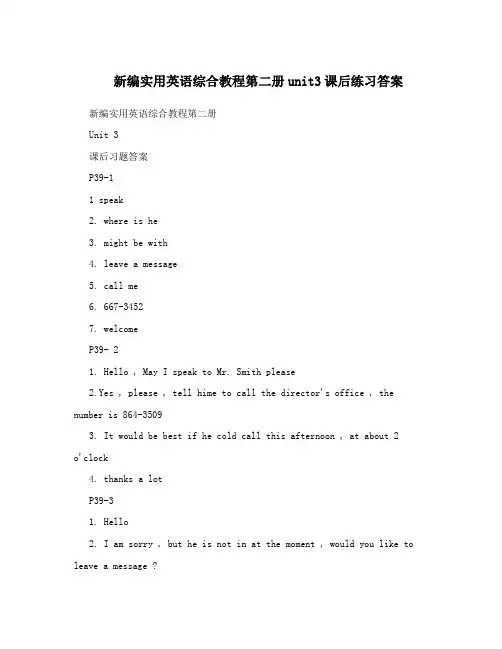
新编实用英语综合教程第二册unit3课后练习答案新编实用英语综合教程第二册Unit 3课后习题答案P39-11 speak2. where is he3. might be with4. leave a message5. call me6. 667-34527. welcomeP39- 21. Hello , May I speak to Mr. Smith please2.Yes , please , tell hime to call the director's office , the number is 864-35093. It would be best if he cold call this afternoon , at about 2o'clock4. thanks a lotP39-31. Hello2. I am sorry , but he is not in at the moment , would you like to leave a message ?3. I 'll tell her as soon as he is back4. You're welcome .P40-31. a telephone message2. a memo3. phone4. at home5. personal6. skills7. a message8. expect9. who called10. what was the message11. friends and family12. questions13. when they called14. the person calling15. reach himP41-41- b 2- dP43-11. Because people stopped talking face to face to one another2. Because his friends was busy talking on the phone , completely forgetting his present3. Because they can be used anywhere and anytime4. Without seeing or talking to one another and with voice mail , we can conduct entire poeple losetheir inimacy of interaction .5. People lose their intimacy of interaction6. He thinks it's great , but worries about its unintended consequences .P43-21. disconnected2. set back3. internet4. talking5. reaching6. answer7. contact8. goes up9. phone10. automatedP43-31. the communications revolution2. their cell phones3. electronic voice4. e-mail5. voice mail6. Directory assistance7. greatP44-41. burden2. advances3. lonely4. invisible5. insert6. attendents7. pets8. chain9. preferable10. deposit11. interrupted12. EvidentlyP44-51. Please dial home and tell them I am on the way to the company2. Since then there was never been any setback in production3. I saw him insert the key into the lock4. I suggest that you make a deposit at the bank5. Yesterday Mr.wang checked out from that hotel .P44- 61. The hall was filled with students waiting for the interview .The square of the village was filled with people waching the football match2. We used to grow beautiful rosesPeter used to go to the small town3. Why is it that this conclusion is wrongwhy is it that she can sing better than I4. As I knew him better , I discovered that my first impression of him was right .We got wiser as we get older5. Why use wood when you can use plastic ?why ask me to do it when you can do it yourself ?6. Pretty soon you won't have the burden of cooking breakfast for himpretty soon you won't take the trouble to send her to go to school everymorning .P46-71-T 2- F 3-T 4-T 5- T 6- F 7-T8- T 9-F 10- T 11. T 12- TP47-91. 不管有时是字母与数字混合使用,所有电话号码都是7位数字。
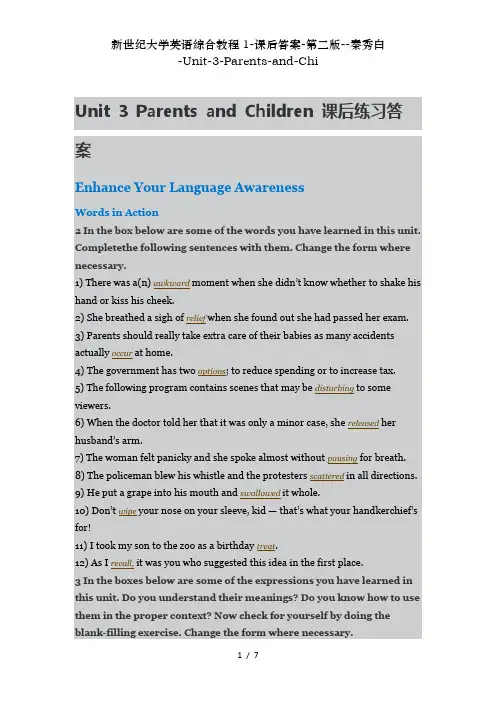
Unit 3 Parents and Children 课后练习答案Enhance Your Language AwarenessWords in Action2 In the box below are some of the words you have learned in this unit. Completethe following sentences with them. Change the form where necessary.1) There was a(n) awkward moment when she didn’t know whether to shake his hand or kiss his cheek.2) She breathed a sigh of relief when she found out she had passed her exam.3) Parents should really take extra care of their babies as many accidents actually occur at home.4) The government has two options; to reduce spending or to increase tax.5) The following program contains scenes that may be disturbing to some viewers.6) When the doctor told her that it was only a minor case, she released her husband’s arm.7) The woman felt panicky and she spoke almost without pausing for breath.8) The policeman blew his whistle and the protesters scattered in all directions.9) He put a grape into his mouth and swallowed it whole.10) Don’t wipe your nose on your sleeve, kid —that’s what your handkerchief’s for!11) I took my son to the zoo as a birthday treat.12) As I recall, it was you who suggested this idea in the first place.3 In the boxes below are some of the expressions you have learned in this unit. Do you understand their meanings? Do you know how to use them in the proper context? Now check for yourself by doing theblank-filling exercise. Change the form where necessary.1) In just a few days he became well acquainted with all his new classmates.2) Jane has locked herself up in her room for the whole day. She took us by surprise when she came out with her hair dyed red.3) Let’s sit down quietly and gather our thoughts first before the discussion.4) To my surprise, the stranger turned out to be an old friend of my mother’s.5) Seeing Jim wearing a funny hat, Maggie tried hard to fight back adesire to laugh.6) Don’t hang up on me — I need to talk to you.7) After quarrelling with his step-father, Colin ran away and hasn’t been heard of ever since.8) They’ve hired someone t o take care of the children for a week.9) When I asked him how he was doing, he hemmed and hawed before telling me that he had just lost his job.10) Once a very shy boy from a small mountainous village, he turned into a competent engineer in a matter of six years.11) The newspaper refused to keep the facts from the public.12) As we sat on the beach soaking up the sunshine, she started to tell me her childhood stories.●Increasing Your Word Power1 Complete the multiple choice exercise by choosing the right answer.1) All the following verbs can form acceptable collocations with the noun RELATIONSHIP except ________.a. makeb. createc. acknowledged. deepene. build2) All the following adjectives can form acceptable collocations with thenoun RELATIONSHIP except ________.a. closeb. mutualc. intimated. potentiale. fluent3) All the following adjectives can form acceptable collocations with thenoun PANIC except ________.a. blindb. suddenc. sturdyd. growinge. total4) All the following verbs can go with the noun PANIC except ________.a. feelb. causec. created. spreade. throw5) All the following verbs can go with the noun RELIEF except ________.a. seekb. createc. experienced. expresse. offer6) All the following adjectives can form acceptable collocations with thenoun RELIEF except ________.a. deepb. sheerc. temporaryd. desperatee. obvious7) All the following verbs can go with the noun MEMORY except ________.a. loseb. arousec. refreshd. survivee. cherish8) All the following adjectives can form acceptable collocations with thenoun MEMORY except ________.a.earlyb. sociablec. lastingd. fonde. vivid2 Many words in English can be used both as nouns and as verbs. Complete all the sentences using either the noun form or the verb form of the words given in the box. Change the form where necessary.1) Please focus your minds on the following problem.2) She has constant fears that her husband will abandon(抛弃)her and the kids.3) The focus of recent research has been on environmental issues.4) Her father died of a heart attack when there was no one else at home.5) She fears that the child may have got a blood problem.6) This kind of disease attacks the central nervous system.7) She paid frequent visits to her parents and they were so happy to see her every time she visited them.8) The blind man touched the elephant’s ear and concluded that the elephant is in the shape of a huge fan.9) My long chat with my mother over the phone every day has relieved a lot of my stress.10) He has got a strange skin problem. Even a light touch on his face hurts.11) The colour of the curtains and the paint on the wall do not match.12) My husband often chats with me over dinner so I know very well what is happening at his workplace.13) The young couple are a perfect match.14) Experts fear that the disease will spread far and wide.3 Did you notice the suffixes -y, -able in words such as panicky and portable in this unit? The suffix -able can be added to a noun or a verbto form an adjective, and -y can be put after a noun to form an adjective. Now form adjectives by adding -y or -able to the words given in the table and write down the Chinese meaning for each adjective. Nouns/Verbs Suffixes Adjectives Chinese Meaningsfault faulty有错误的;有缺点的;不完善的guilt guilty有罪的;有过失的hand handy 手边的;方便的panic panicky惊恐的;易恐慌的pick picky吹毛求疵的;爱挑剔的adapt-y/-able adaptable能适应新环境的;适应性强的imagine imaginable可想象的;想得到的port portable便于携带的;轻便的predict predictable可预言的;可预料的rely reliable可靠的;可信赖的Complete each of the following sentences with a proper word you have thusformed.1) He pleaded guilty to charges of theft (盗窃) and robbery in court.2) I’m sure she’ll cope with the changes very well; she’s very adaptable.3) Keep your pills handy just in case you feel carsick.4) The doctor tried every means imaginable to save the patient, but invain.5) Considering the great disparity (悬殊)in strength between the twoteams, the result is predictable .6) Many people feel panicky when speaking before the public.7) If the product you bought turns out to be faulty , you may request arepair ora replacement.8) He is such a picky eater that he won’t eat anything but fresh vegetable.9) He’s not very reliable . You’d better not count on him to help you out.10) A portable computer is a computer designed to be easily moved fromone location to another.Grammar in ContextObserve the following sentences from both Text A and Text B, paying special attention to the use of the past perfective aspect of the verb. Then do the following two tasks.Task 1: Combine each pair of sentences into one by making use of the past perfect aspect of the verb.1) a. We rushed to the railway station.b. We found the train left already.We rushed to the railway station, but found the train had left.2) a. I learnt some English at high school in China.b. I became an English Major at an American college after I finished highschool in China.Before I became an English major at an American college, I had learnt someEnglish at high school in China.3) a. I got to the cinema by bike.b. Kathy got there even earlier and picked up the tickets.Kathy had already picked up the tickets by the time I got to the cinema by bike.4) a. I shut the door.b. Immediately afterwards the telephone rang.No sooner had I shut the door than the telephone rang.or: I had no sooner shut the door than the telephone rang.5) a. The teacher explained the theory in detail.b. Then the students understood.The students did not understand until the teacher had explained the theory indetail.Task 2: A theft happened in a company last Saturday. John, the person who was onduty, was telling a friend what had happened. Imagine you are John andyour partner his friend. Tell him what happened using the following clues.You need to add what is missing and make use of the past perfect aspect ofverbs whenever necessary to indicate the sequence of the events.Before I left the office at 5 o’clock, I had locked the office door. When I passed bythe office an hour later, 1) I saw the door open. I felt a bit surprised, so I stoppedand went in to take a look. When I saw the mess in the office, I knew2) the office had been broken into. I took a quick look around and found that3) quite a few things had been stolen. I called the police immediately. By the time the police arrived, my boss and my colleagues 4) had already come back to the office. Tom said that 5) the 200 dollars he had locked in his drawer was gone. Dylan’s camera, which he 6) had just bought, was also gone. My boss suffered the heaviest loss.7) A few computers in the office had been stolen. The police searched the office, butwere unable to find any clues.ClozeComplete the following passage with words chosen from this unit. The initial letter of each is given.My mother and I always enjoyed our chat together under a pine tree in the park. At our r ecent (1) meeting, however, her pale face took me by s urprise (2).I asked her what was wrong, and her s ad / solemn (3) look and silence mademe believe that she was k eeping (4) something bad from me. Apparently, something serious was d isturbing (5) her. At first, she remained silent. Finally, after my persistent i nquiries (6), she could not hold it any longer anda dmitted (7)to me that she had a very serious heart disease. It suddenly o ccurred (8) to me that three years ago, she had heart s urgery (9) but her condition did not improveafterwards and now there were hardly any o ptions (10) left. I reached over and wrapped my arms t ightly (11) around my mother and cried. As we sat there that cool April afternoon s oaking (12) up the sun and smelling the fresh s cent (13) of the grass, I had one wish in my heart that I could have more g atherings (14) withmy mother in the days to come.TranslationTranslate the following sentences into English, using the words and expressionsgiven in brackets.1) 我们是好朋友,可他居然将这么大的一件事瞒着我,实在令我吃惊。
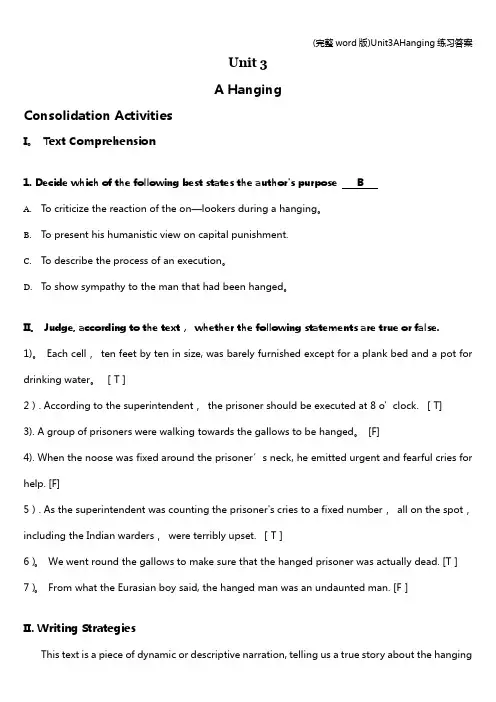
Unit 3A HangingConsolidation ActivitiesI。
Text Comprehension1. Decide which of the following best states the author's purpose BA.To criticize the reaction of the on—lookers during a hanging。
B.To present his humanistic view on capital punishment.C.To describe the process of an execution。
D.To show sympathy to the man that had been hanged。
II。
Judge, according to the text,whether the following statements are true or false.1)。
Each cell,ten feet by ten in size, was barely furnished except for a plank bed and a pot for drinking water。
[T]2). According to the superintendent,the prisoner should be executed at 8 o’clock. [T]3). A group of prisoners were walking towards the gallows to be hanged。
[F]4). When the noose was fixed around the prisoner’s neck, he emitted urgent and fearful cries for help. [F]5). As the superintendent was counting the prisoner's cries to a fixed number,all on the spot,including the Indian warders,were terribly upset. [T]6)。

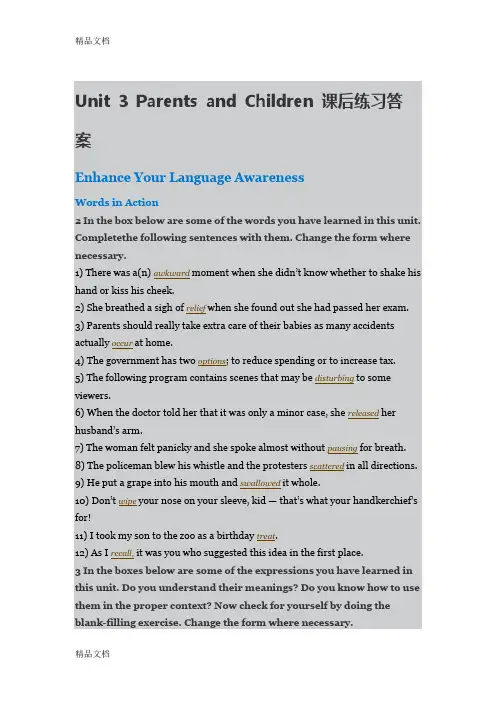
Unit 3 Parents and Children 课后练习答案Enhance Your Language AwarenessWords in Action2 In the box below are some of the words you have learned in this unit. Completethe following sentences with them. Change the form where necessary.1) There was a(n) awkward moment when she didn’t know whether to shake his hand or kiss his cheek.2) She breathed a sigh of relief when she found out she had passed her exam.3) Parents should really take extra care of their babies as many accidents actually occur at home.4) The government has two options; to reduce spending or to increase tax.5) The following program contains scenes that may be disturbing to some viewers.6) When the doctor told her that it was only a minor case, she released her husband’s arm.7) The woman felt panicky and she spoke almost without pausing for breath.8) The policeman blew his whistle and the protesters scattered in all directions.9) He put a grape into his mouth and swallowed it whole.10) Don’t wipe your nose on your sleeve, kid —that’s what your handkerchief’s for!11) I took my son to the zoo as a birthday treat.12) As I recall, it was you who suggested this idea in the first place.3 In the boxes below are some of the expressions you have learned in this unit. Do you understand their meanings? Do you know how to use them in the proper context? Now check for yourself by doing theblank-filling exercise. Change the form where necessary.1) In just a few days he became well acquainted with all his new classmates.2) Jane has locked herself up in her room for the whole day. She took us by surprise when she came out with her hair dyed red.3) Let’s sit down quietly and gather our thoughts first before the discussion.4) To my surprise, the stranger turned out to be an old friend of my mother’s.5) Seeing Jim wearing a funny hat, Maggie tried hard to fight back adesire to laugh.6) Don’t hang up on me — I need to talk to you.7) After quarrelling with his step-father, Colin ran away and hasn’t been heard of ever since.8) They’ve hired someone t o take care of the children for a week.9) When I asked him how he was doing, he hemmed and hawed before telling me that he had just lost his job.10) Once a very shy boy from a small mountainous village, he turned into a competent engineer in a matter of six years.11) The newspaper refused to keep the facts from the public.12) As we sat on the beach soaking up the sunshine, she started to tell me her childhood stories.●Increasing Your Word Power1 Complete the multiple choice exercise by choosing the right answer.1) All the following verbs can form acceptable collocations with the noun RELATIONSHIP except ________.a. makeb. createc. acknowledged. deepene. build2) All the following adjectives can form acceptable collocations with thenoun RELATIONSHIP except ________.a. closeb. mutualc. intimated. potentiale. fluent3) All the following adjectives can form acceptable collocations with thenoun PANIC except ________.a. blindb. suddenc. sturdyd. growinge. total4) All the following verbs can go with the noun PANIC except ________.a. feelb. causec. created. spreade. throw5) All the following verbs can go with the noun RELIEF except ________.a. seekb. createc. experienced. expresse. offer6) All the following adjectives can form acceptable collocations with thenoun RELIEF except ________.a. deepb. sheerc. temporaryd. desperatee. obvious7) All the following verbs can go with the noun MEMORY except ________.a. loseb. arousec. refreshd. survivee. cherish8) All the following adjectives can form acceptable collocations with thenoun MEMORY except ________.a.earlyb. sociablec. lastingd. fonde. vivid2 Many words in English can be used both as nouns and as verbs. Complete all the sentences using either the noun form or the verb form of the words given in the box. Change the form where necessary.1) Please focus your minds on the following problem.2) She has constant fears that her husband will abandon(抛弃)her and the kids.3) The focus of recent research has been on environmental issues.4) Her father died of a heart attack when there was no one else at home.5) She fears that the child may have got a blood problem.6) This kind of disease attacks the central nervous system.7) She paid frequent visits to her parents and they were so happy to see her every time she visited them.8) The blind man touched the elephant’s ear and concluded that the elephant is in the shape of a huge fan.9) My long chat with my mother over the phone every day has relieved a lot of my stress.10) He has got a strange skin problem. Even a light touch on his face hurts.11) The colour of the curtains and the paint on the wall do not match.12) My husband often chats with me over dinner so I know very well what is happening at his workplace.13) The young couple are a perfect match.14) Experts fear that the disease will spread far and wide.3 Did you notice the suffixes -y, -able in words such as panicky and portable in this unit? The suffix -able can be added to a noun or a verb to form an adjective, and -y can be put after a noun to form anadjective. Now form adjectives by adding -y or -able to the words given in the table and write down the Chinese meaning for each adjective. Nouns/Verbs Suffixes Adjectives Chinese Meaningsfault faulty有错误的;有缺点的;不完善的guilt guilty有罪的;有过失的hand handy 手边的;方便的panic panicky惊恐的;易恐慌的pick picky吹毛求疵的;爱挑剔的adapt-y/-able adaptable能适应新环境的;适应性强的imagine imaginable可想象的;想得到的port portable便于携带的;轻便的predict predictable可预言的;可预料的rely reliable可靠的;可信赖的Complete each of the following sentences with a proper word you have thusformed.1) He pleaded guilty to charges of theft (盗窃) and robbery in court.2) I’m sure she’ll cope with the changes very well; she’s very adaptable.3) Keep your pills handy just in case you feel carsick.4) The doctor tried every means imaginable to save the patient, but invain.5) Considering the great disparity (悬殊)in strength between the twoteams, the result is predictable .6) Many people feel panicky when speaking before the public.7) If the product you bought turns out to be faulty , you may request arepair ora replacement.8) He is such a picky eater that he won’t eat anything but fresh vegetable.9) He’s not very reliable . You’d better not count on him to help you out.10) A portable computer is a computer designed to be easily moved fromone location to another.Grammar in ContextObserve the following sentences from both Text A and Text B, paying special attention to the use of the past perfective aspect of the verb. Then do the following two tasks.Task 1: Combine each pair of sentences into one by making use of the past perfect aspect of the verb.1) a. We rushed to the railway station.b. We found the train left already.We rushed to the railway station, but found the train had left.2) a. I learnt some English at high school in China.b. I became an English Major at an American college after I finished highschool in China.Before I became an English major at an American college, I had learnt someEnglish at high school in China.3) a. I got to the cinema by bike.b. Kathy got there even earlier and picked up the tickets.Kathy had already picked up the tickets by the time I got to the cinema by bike.4) a. I shut the door.b. Immediately afterwards the telephone rang.No sooner had I shut the door than the telephone rang.or: I had no sooner shut the door than the telephone rang.5) a. The teacher explained the theory in detail.b. Then the students understood.The students did not understand until the teacher had explained the theory indetail.Task 2: A theft happened in a company last Saturday. John, the person who was onduty, was telling a friend what had happened. Imagine you are John andyour partner his friend. Tell him what happened using the following clues.You need to add what is missing and make use of the past perfect aspect ofverbs whenever necessary to indicate the sequence of the events.Before I left the office at 5 o’clock, I had locked the office door. When I passed bythe office an hour later, 1) I saw the door open. I felt a bit surprised, so I stoppedand went in to take a look. When I saw the mess in the office, I knew2) the office had been broken into. I took a quick look around and found that3) quite a few things had been stolen. I called the police immediately. By the time the police arrived, my boss and my colleagues 4) had already come back to the office. Tom said that 5) the 200 dollars he had locked in his drawer was gone. Dylan’scamera, which he 6) had just bought, was also gone. My boss suffered the heaviest loss.7) A few computers in the office had been stolen. The police searched the office, butwere unable to find any clues.ClozeComplete the following passage with words chosen from this unit. The initial letter of each is given.My mother and I always enjoyed our chat together under a pine tree in the park. At our r ecent (1) meeting, however, her pale face took me by s urprise (2).I asked her what was wrong, and her s ad / solemn (3) look and silence mademe believe that she was k eeping (4) something bad from me. Apparently, something serious was d isturbing (5) her. At first, she remained silent. Finally, after my persistent i nquiries (6), she could not hold it any longer anda dmitted (7)to me that she had a very serious heart disease. It suddenly o ccurred (8) to me that three years ago, she had heart s urgery (9) but her condition did not improveafterwards and now there were hardly any o ptions (10) left. I reached over andwrapped my arms t ightly (11) around my mother and cried. As we sat there thatcool April afternoon s oaking (12) up the sun and smelling the fresh s cent (13) of the grass, I had one wish in my heart that I could have more g atherings (14) withmy mother in the days to come.TranslationTranslate the following sentences into English, using the words and expressionsgiven in brackets.1) 我们是好朋友,可他居然将这么大的一件事瞒着我,实在令我吃惊。
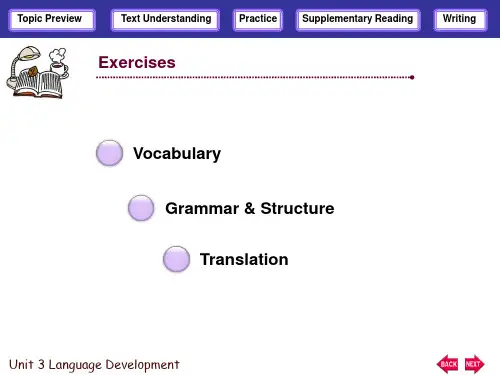
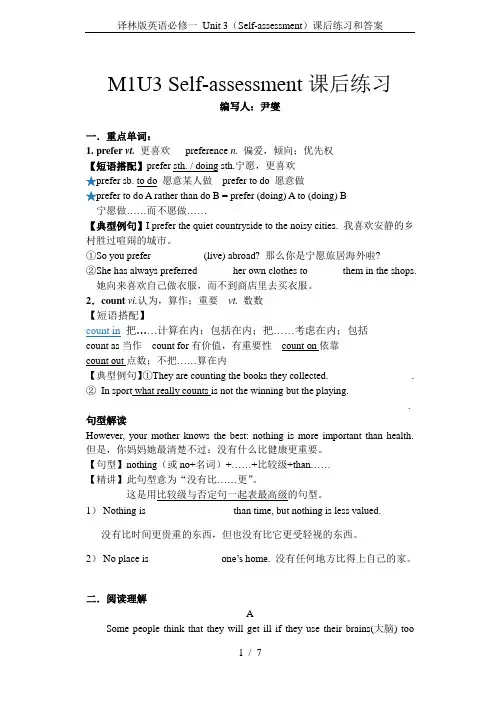
M1U3 Self-assessment课后练习编写人:尹燮一.重点单词:1. prefer vt.更喜欢preference n. 偏爱,倾向;优先权【短语搭配】prefer sth. / doing sth.宁愿,更喜欢★prefer sb. to do 愿意某人做prefer to do 愿意做★prefer to do A rather than do B = prefer (doing) A to (doing) B宁愿做……而不愿做……【典型例句】I prefer the quiet countryside to the noisy cities. 我喜欢安静的乡村胜过喧闹的城市。
①So you prefer __________(live) abroad? 那么你是宁愿旅居海外啦?②She has always preferred ______ her own clothes to ______ them in the shops. 她向来喜欢自己做衣服,而不到商店里去买衣服。
2.count vi.认为,算作;重要vt. 数数【短语搭配】count in把……计算在内;包括在内;把……考虑在内;包括count as当作count for有价值,有重要性count on依靠count out点数;不把……算在内【典型例句】①They are counting the books they collected. ________________.②In sport what really counts is not the winning but the playing.________________________________________________________________. 句型解读However, your mother knows the best: nothing is more important than health. 但是,你妈妈她最清楚不过:没有什么比健康更重要。
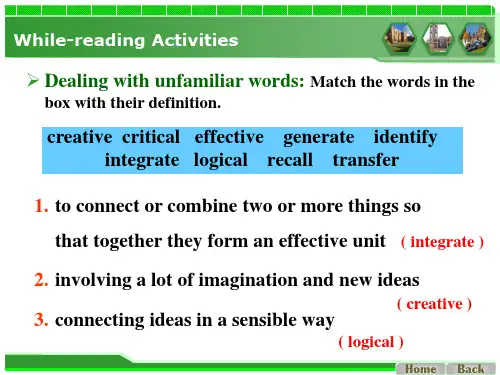
全新版大学英语unit3课后练习答案VocabularyI. 1. 1)rude 2) physically3)structure 4) made a difference5) blurted (out) 6) chuckling7) measurable 8) prospective9) preparations 10) sparkled11) took a crack at 12) partner2. 1) go after 2) look back on/at3) be put up 4)stood for5) build in 6) follow up7) be hooked up to (连接到) 8) closed up 3. 1) Mary’s parents grilled her about where she had been all night.2) Before the appearance of her Fairy Godmother, it was beyond Cinderella’s wildest dreams that she could one day dance in the King’s palace.3) The translation of the popular novel has just finished anda Chinese version will be in readers’ hands soon.4) As with anything else, it is important to do your homework before going on aninterview.5) Jim’s car broke down last week and the repair cost was in the neighborhood of 150 dollars.4. 1) The director of the Urban Development Office(城市开发办公室)will interview the two local applicants, as well as the two other veteran(经验丰富的,老兵的)landscaper s(庭园设计家)recommended by the staff committee(委员会)this afternoon, to pick out the prospective designer for the construction of the city square(广场).2) From his standpoint, the project manager has made every endeavor to go after the best engineer for the work of cleaning up the river before the deadline set by the mayor.3) Life is short, as the saying goes. People in my age bracket often want to have a crack at everything they think is interesting, but the problem is they barely have the time or energy for such endeavors.II. Words with Multiple Meanings1. When in Rome, do as the Romans do. (behave)2. Richard su ggested I keep all my friends’addresses on my computer, as he does his. (used to avoid repetition)3. Elizabeth told her daughter that if she did the bathroom, the kitchen and the living room, she would get $10.00 every week. (clean)4. Since the Smiths’business is doing well, they are thinking of starting a similar type of business in Canada. (get along)5. If you are prepared, you can certainly do the job. (perform /complete)6. Knowing what you cannot do is more important than knowing what you can. (perform or complete )7. When I asked John why he does philosophy, he said that he does it simply because he finds it interesting. (study)8. A small piece of cake will do for me, thanks, (be enough)9. Leisure(休闲服) is a beautiful garment(衣服, but it will not do for constant(经常的)wear. (be acceptable)III. Usage1. There is so much to say and it is hard to know where to begin. OK, I'll talk about myself first.2. Thank you very much, John, for your beautiful Christmascard. By the way, I have something here for you.3. The new computer language can be quite easily understood by anyone who can read the daily newspaper. Now,why is this an advantage?4. I’m going to work out the outline(大纲) and will let you know how it goes. By the way. I will see you in February, as I plan to attend your seminar(谈论会)in Shanghai.5. OK, you got the job. Now,how to maximize(取得最大值) your profits with as little effort as possible?6. Chris has been back from Australia. Incidentally, those pictures you sent me arewonderful.I. Cloze(A)1. prospective2. As I see it3. done your homework4. beforehand5. endeavor6. structure7. partners 8.Respond9. take a crack 10. from the standpoint11. make a difference 12. follow up(B)1. encouraging2. inquiry3.relevant4. samples5. references6. advice7.preparing 8.seriously9. probably 10. exhibitII. Translation1.1) Despite the inadequate length of theairstrip in this emergency landing, the veteran pilot managed to stop the plane after taxiing for only a short while.2) Grilled by the reporters, the movie stareventually blurted (out)that she had undergone two plastic surgeries.3) We have the technology and ourpartner has the capital. Working together, we’ll have the future in our hands.4) If I had known beforehand that youwould bring so many friends home, I would have made better preparations.You see, I have barely enough food and drinks for a snack.5) People gave generously upon learningthat new school rooms with stronger structures were to be built in the earthquake-stricken area.2. Well begun, is half done, as the saying goes. It is extremely important for a job applicant to do his homework while seeking employment. From my standpoint, whether or not one has done his homework clearly makes a difference in his chance of success.I have a friend who is earning somewhere in the neighborhood of 100,000 dollars a yearin a large computer software company. He told me that from his own experience the decision makers who interview prospective employees like people who are well prepared. Those who make no endeavor to learn as much about his prospective employer as possible don’t have much of a chance of success.。
Unit3 How do you get to school题一:首字母填空I r________ my bike to the subway station.It t_________ me an hour to g et there.How f_____ is it from your home to school?I go to school by s_________ every day.Radio and television are important m_______ of communication .题二:My father d____ to work every day.I often get up at h____ past six in the morning.You should be careful when you c____ the road.There is an old stone b_____ over the river.There are 2,000 v______ in the village.题三:选词完成句子live; take; leave for; think of; stop; come trueOur wishes will ____________.It usually ________ about half an hour to get to school.He _____________ his company at about half past eight.Lucy ___________ far away from her school.What do you ____________ your new job?You can wait for me at the bus ___________.题四:选词完成句子live; take; leave for; think of; stop; come trueIf you learn a few foreign languages, your dream will ____________.It ________ her twenty minutes to get there by bike and forty minutes on foot.I am ready to _______ Shanghai.Tom ___________ 60 miles away from school.What do you ____________ your English teacher?There are a lot of people at the bus ___________.题五:用所给单词的适当形式填空。
课后练习答案(全新版大学英语综合教程第二版第2册UNIT3)Unit 3 The Generation GapText A Father Knows BetterI. Vocabulary1. Fill in the gaps with words or phrases…1) typical 2) dumb 3) junior 4) glorious 5) welfare 6) came over7) interference 8) fading 9) narrowed down 10) frank 11) schemes12) at any rate2. Rewrite each sentence…1) consists of five generals and four police officers.2) will be in a location overlooking the lake.3) was humiliated by her comments about my family background in front of so many people.4) have any proof that it was Henry who stole the computer?5) was exhausted after the long cycle ride.3. Complete the sentences1) hysterical, was handed down by, should have known better than2) twisted, over and over, talented son,3) patience, not to keep him in suspense, assured…repeatedlyII. Collocation1. adequate2. anxious3. certain4. content5. crazy6. likely7. fortunate8. keenIII. Usage1. be admitted2. live3. be postponed4. buy5. be banned6. beComprehensive ExercisesI. Cloze1. Text-related1) typical 2) welfare 3) constant 4) frank 5) talent 6) dumb7) know better than that 8) repeatedly 9) dread 10) interference11)bet 12)assure2. Theme-related1. despite2. really3. same4. contact5. admitted6. attempt7. not8. tend 9. different 10. mannerII. Translation1. Translate the Sentences1) Have scientists found proof of water on Mars?2) The planning committee has narrowed down the possible locations for the nuclear power plant to two coastal towns.3) Sam not only lost his job but also both legs; he had to live on welfare for the rest of his life.4) A jury consisting of 12 members voted in unison that Mary was guilty.5) Sean felt humiliated to hear his talent being questioned.2. Translate the passageGeorge, the son of Mr. Johnson, liked listening to heavy metal music in the evenings, which made it hard for other residents in the community to fall asleep. Eventually the exhausted neighbors lost their patience and decided on direct interference. They called Mr. Johnson to tell him in a frank manner what they were thinking. Mr. Johnson assured them that he would certainly settle the issue. As soon as he put down the phone he scolded his son, “What has come over you? You should know better than to disturb others for your own amusement.”In the end George traded his CDs for computer games software from his classmates.。
Unit 3Text ALanguage focusWords in use3.1. peculiar;2. radical;3. phase;4. sensible;5. predict;6. labeled;7. resent;8. witnessed;9. equivalent; 10. parallels;Word building51. journal;2. chaotic;3. cooperate;4. erosion;5. dramatic;6. confuse;7.academy;8.rightists;9.depression; 10.dictate; 11.detection; 12.classificationBanked cloze61.K2.E3.A4.C5.L6.I7.G8.N9.H 10.OExpressions in use71. saddled with;2. back off;3. gives way to;4. resorted to5. make allowances for;6. wonder at;7. prior to;8. based upon/onStructure analysis and writingStructured writing8The Odyssey years are certainly a very complicated phase of life for young people. Not only do these young people need to overcome many difficulties, they also have to face many challenges form their parents. The differences between parents and children can be well observed in their completely different attitudes and views.First, they differ in their attitude toward life. Parents always wonder what has gone wrong with the new generation. They feel that during their time, young boys and girls were better behaved, more obedient and had greater respect for elders. Young people, on the other hand, feel that they are capable enough to learn on their own rather than lean heavily on the older generation for guidance. Young people do not like to be spoon-fed by their parents.The differences also appear in the way the two generations look at things. For example, the parents’ generation never understood Elvis and the Beatles. Because they couldn’t understand what was going on, they were frequently opposed to them and saw rock as “the devil’s music”. Young people, however, are crazy about the modern music and would love to listen to it for a hundred times a day. Wherever th ey go, they’ll have their iPod with them.In conclusion, it’s very difficult for parents and their youngsters to get along due to their distinctive attitudes and the way they view things. To fill this gap, both parents and their grown children need to be more understanding to each other.Translation9作为美国文化价值体系的一个重要组成部分,“个人主义”受到大多数美国人的推崇。
Unit 3 Born to WinIn-Class Reading课内阅读参考译文生而成功一个人不可能事事由别人来教你,只能在别人的帮助下靠自己去发现。
——伽利略1 每个人生来都是独特的,与众不同的。
每个人都有能力以自己特有的方式去赢得成功。
每个正常人都能够看、听、触摸、品尝并且思考自己的事情。
每个人都有自己特有的潜在性――能力和局限性。
每个人都能凭自己的本事成为举足轻重、会思考、明事理、创造性成果颇多的人——一位成功的人。
2 “成功者”和“失败者”这两个词有多种意思。
当我们把一个人称作成功者时,我们所指的并不是那种通过优势战胜他人而获得成功的人。
而是一个无论是作为个体或是社会的成员他都能可靠、迅速地采取行动做出真诚回应的人。
失败者是一个不会采取行动作出真诚回应的人。
3 很少有人是绝对的成功者或失败者。
这(成败)只是一个程度的问题。
然而,当一个人一旦具有了成为成功者的能力时,(他)经常获得成功的可能性就会更大。
4 对成功者来说成就不是最重要的;最重要的是真诚。
真诚的人知道自己的独特之处,也赞赏他人的这一特点。
5 成功者是不怕独立思考并运用自己知识的。
他能把客观事实与主观意见区分开来,而且不会装作能解决一切问题。
他倾听他人、评价他们说的话,却能得出自己的结论。
6 成功者能灵活变通。
(他)遇事不会采用已有的、刻板的方式行事。
他能根据形势的需要改变自己的计划。
成功者热爱生活。
他乐于工作、喜爱游玩、享受美食、欣赏他人和自然带来的乐趣。
他心安理得地欣喜自己的成就。
他(也)毫无妒忌地欣赏他人的成绩。
7 成功者关心天下、关爱世人。
他贴近社会上普遍存在的问题。
他努力提高生活质量。
即使面对国内和国际上的难题,他也不会认为自己是无能为力的。
他做一切力所能及的事,使世界变得更美好。
8 即使人们生来注定会成功,但也是生来就要完全依赖于周围环境的。
成功者顺利地完成从依赖到独立的转变。
失败者则没有做到这一点。
在这一过程的某个时候失败者开始回避独立。
Unit 3 Section A. Where Principles Come First Part Ex. II, p. 69 1. It operates on the principle that if you teach students the merit of such values as truth, courage, integrity, leadership, curiosity and concern, then academic achievement naturally follows.
2. It is famous for its work with troubled youngsters. 3. Because teachers protested the program’s demands and the strain associated with more intense work.
4. The community feared the school would attract inner-city minority and troubled students. 5. In the Hyde School, all students are required to take performing arts and sports, and provide a community service. For each course, students get a grade for academic achievement and for “best effort”.
6. Parents must agree to accept and demonstrate the school’s philosophies and outlook. 7. The biggest obstacle for many parents is to realize their own weaknesses. 8. Faculty evaluations are conducted by the students. Part Ⅲ, p. 69 1. cultivate 2. comprehensive 3. controversial 4. suspend 5. strain 6. preliminary 7. conventional 8. reform Part Ⅳ, p. 70 1. His girlfriend’s father saw him as a man who could not make a living. 2. The course was cancelled over the students’ protests. 3. The problem is so difficult that we cannot work it out without the help of our teacher. 4. Children tend to do their utmost when they are encouraged by their parents who are making similar efforts.
5. The new teaching program didn’t work well in the school at the outset. 6. I was kind of excited when I received the letter that allowed me an interview. 7. The school is scheduled to open on September 1. 8. They appeared to offer a free lunch, complete with cigars and wine. Part Ⅴ, p. 70 1. insights 2. attention 3. recognition 4. entrance 5. control 6. acceptance 7. speed 8. weight Part Ⅵ, p. 71 1. historic 2. atomic 3. Arabic 4. energetic 5. economic 6. heroic Part VII, p. 71 1. responsibility 2. rapidity 3. elasticity 4. curiosity 5. publicity Part VIII, p. 72 1. In Britain, as in America, there is a great demand for educational reform. 2. In Greece, as in Italy, people use a lot of olive oil in cooking. 3. As in the Hyde School, values such as courage, integrity, leadership, curiosity and concern are the first, most important lesson in some public inner-city schools in Maryland.
4. In China, as in Japan, a large number of middle school students take supplementary classes in order to get into a famous university.
5. As in the middle of the 1950s, many young people went down to the countryside in the late 1960s and early 1970s.
Part Ⅸ, p. 73 1. Once you’ve practiced a bit, you’ll find that it’s quite easy. 2. Once the meal was finished, the discussion began. 3. Once you show any fear, he will attack you. 4. The decision took about 10 seconds once he’d read a market research study. 5. Once customers come to rely on these systems, they almost never take their business elsewhere.
Part Ⅹ, p. 73 1. Our school operates on the principle that moral values and academic achievements are equally important. 2. The new teaching program was suspended last term because the teachers in the department protested its demands and the strain associated with more intense work.
3. We see ourselves as preparing our students for a way of life by cultivating a comprehensive set of principles that can affect all of them.
4. The basis of the Character First idea is that every human being has a unique potential that is based on character, not intelligence or wealth.
5. We were warned by the teacher in the first lesson that students got a grade not only for academic achievement but also for attendance and best effort.
6. Once parents agree in writing to accept and demonstrate the school’s philosophies and outlook, the students can gain admission.
7. In the Hyde School greater attention is paid to the establishment of a fruitful relationship with each student while in the traditional high school setting the focus is on the teacher and the material.
8. The school stresses the idea that it is worthwhile for parents to participate in school activities together with their children.
Part XI, p. 73 1. 该校的创始人约瑟夫–高尔德声称学校的教学计划很成功。海德中学坐落在缅因州巴思市,每年的学费高达1.8万美元,因其教导问题少年有方而遐迩闻名。
2. 在一堂英语课上,11名学生用最后的五分钟展开激烈的讨论,依照1-10的评分标准相互评价他们当天的课堂表现。
3. 为了避免美国中学使用的其他品格培养方案所引发的争议,高尔德解释说,“全力以赴” 这一概念并不是要强迫学生接受某一套道德原则或宗教观念。
4. 家长签约同意每月出席一次区小组会议(共20个区小组),每年去区休养所三天,每年至少参加三次巴思市的研修班、讨论组和研讨会。
5. 公立学校学生家长的活动计划仍在制定当中。这项工作的困难要大得多,因为很难使家长们相信自身的参与很有价值。